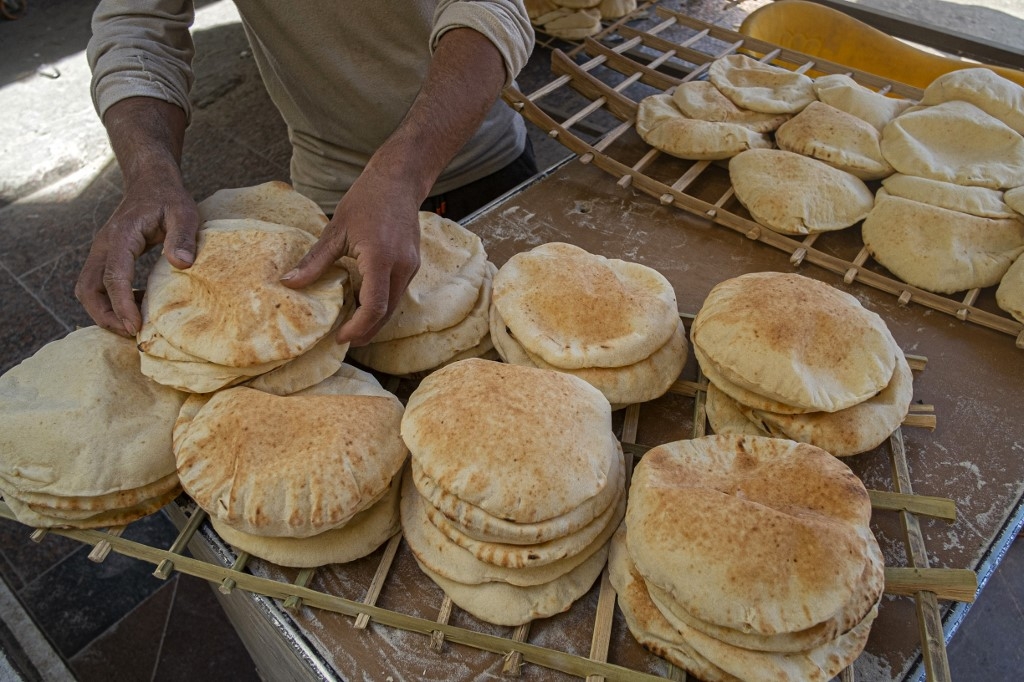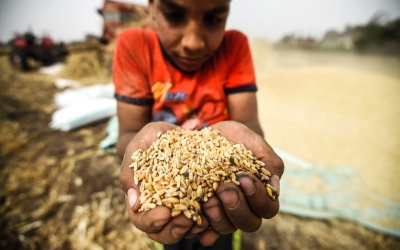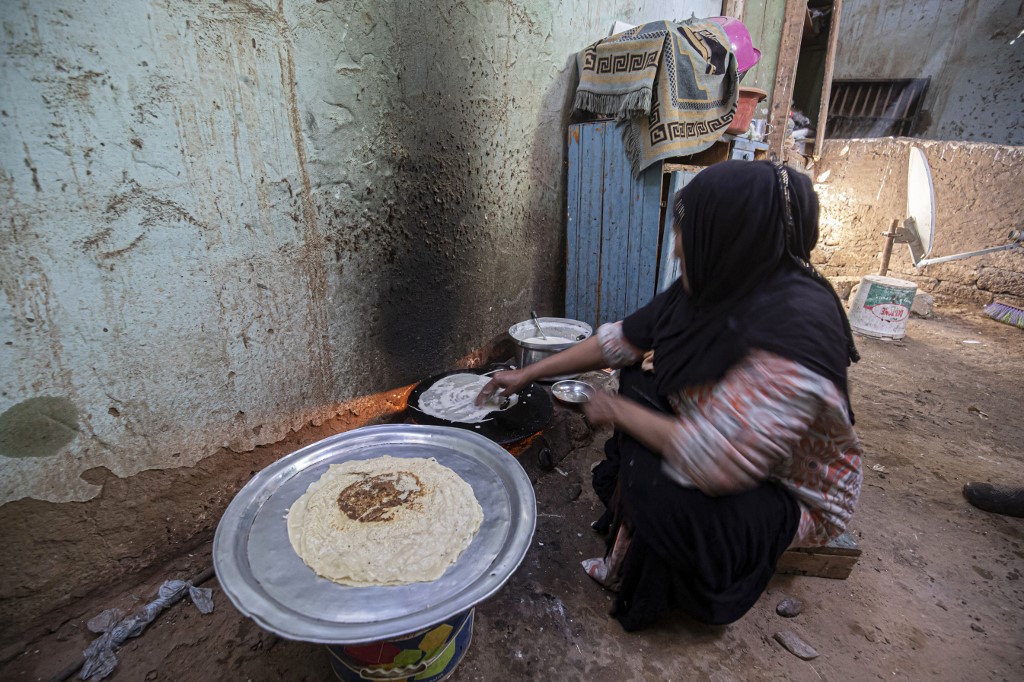Feeding the 72 million: Egypt's grand wheat plan splits the industry

In the wake of the Russia-Ukraine war, Egypt's decision to force local wheat producers to sell a slice of their output to the government has split the industry, with some farmers set to gain and others facing job losses.
On Wednesday, authorities introduced measures they hope will incentivise Egyptian growers to sell more wheat: raising prices, setting quotas, and threatening farmers with prison if they do not deliver.
Politicians say these unprecedented measures are necessary if Egypt wants to keep bread on the table.
'You cannot tell the farmers who they have to sell their produce to. Are we in a free market anymore?'
- Hussein Abu Saddam, Farmers' Union
"This decision is very important for securing food for these people," Hesham al-Husari, the head of the Committee on Agriculture and Irrigation at the House of Representatives, Egypt’s lower chamber of parliament, told Middle East Eye.
"We cannot bring together the required strategic reserves of wheat without such a decision.
"Governments, I believe, have the right to take exceptional measures to protect their national security and the livelihoods of their peoples,” he added.
While some smaller producers are glad for the measures, others fear the decision will hurt the private sector and wipe out the livelihoods of the country's wheat traders.
Hussein Abu Saddam, the head of the Farmers' Union, Egypt’s unofficial farmers’ guild, had hoped the government would encourage wheat producers to sell their output by freeing up market dynamics.
"You cannot tell the farmers who they have to sell their produce to," Hussein Abu Saddam, the head of the Farmers' Union, told MEE. "Are we in a free market anymore?"
"The government could have done this by increasing the price and raising it to international market rates," Abu Saddam said.
The new price is around 400 pounds ($25) a tonne less than the price in the international market.
Egypt is by far the world’s largest importer of wheat. It gets almost 80 percent of its supply from Russia and Ukraine.
Russia’s invasion of its neighbour - and the ensuing sanctions and hit on global markets - has slashed supply and doubled Egypt’s bread prices.
Egypt, like other wheat-importing countries around the region suffering from shortages and price hikes, is particularly vulnerable when it comes to grain supplies.
The country spends billions of pounds annually on a vast bread subsidy scheme for tens of millions of people living on rations.
To wean itself off Russian and Ukrainian wheat the government is looking to boost domestic production.
Bushel and stick
Egypt’s wheat harvest lasts from early April until the end of June.
The country is hoping that its plan to rely on its own wheat reserves and local production will be enough to cover domestic consumption of the vital grain until 2023.
The drive for self-sufficiency has two motors.
Firstly, the government has offered incentives to local wheat producers to encourage them to sell their produce to the government instead of the private sector.
Secondly, the ministry of supply now requires growers to sell a certain amount to government-affiliated buyers.
The authorities' decision on 16 March committed local farmers to sell 12 ardebs (or 5.5 wheat bushels) per acre (enough for 37 bushels) to one of three government-owned companies.
To incentivise farmers to sell, the ministry raised the price of each ardeb to 885 Egyptian pounds ($57), bringing the price of each tonne of wheat to 5,900 Egyptian pounds ($380).
The day before, the government had raised the price per ardeb by 65 pounds ($4) from 820, after a previous rise in November.
Fertilisers will be free in the summer season for those who sell 90 percent of their wheat to the government.
But those who fail to deliver their quota to government-run silos risk between six months and two years in jail and a fine of between 100,000 pounds ($6,450) and 500,000 pounds ($32,250).
This appears to be the first time that Cairo has resorted to such exceptional measures to secure enough wheat for Egypt’s subsidised bread.
Apart from banning the export of a long list of food items, the government is also imposing tight controls on the commodities market to ensure that traders will not raise prices.
Egyptian President Abdel Fattah el-Sisi has instructed the government to determine the price of unsubsidised bread for those unregistered in the food rationing system.
Producers divided
Some producers, especially small ones, have welcomed the new regulations.
Farmers, they said, would readily sell their produce to the companies designated by the government.
"The government will get the wheat to produce bread for people," Abul Mahasen Ramadan, a wheat farmer from Menoufia in the Nile Delta, in the north of the country, told MEE. "This is why all the farmers will sell their output to the government."
Ramadan said farmers like him would not object to the new government wheat price.
'The farmers have to support the government and save their country from falling'
- Abdel Kareem Hussein, wheat farmer
But he hopes farmers will be supported. "The government should sell us production requirements - including fuel, fertilisers, and pesticides - at reasonable prices," he said. "The prices of production requirements are getting very high."
Abdel Kareem Hussein, another wheat farmer from nearby Sharqiya, said the new price of wheat would encourage farmers to grow more.
"The farmers have to support the government and save their country from falling," Hussein told MEE.
Hussein said the new policy serves small wheat producers best because it ensures they will find buyers for their produce.
Such producers are often shunned by the government for the sake of large ones and exploited by the private sector.
"Small producers used to be kept waiting outside government silos until large producers weighed and handed over their produce," Hussein said.
"Some of the small producers were turned back by the silos, leaving them to be preyed on by the private sector."
Munching the numbers
Bread production is a crucial issue for Egypt - people, especially poorer families, are heavily dependent on it for daily sustenance.
72 million Egyptians - out of a population of 102 million - are enrolled in the country’s national food rationing system.
The number could be even higher if the government had not stopped accepting people onto the scheme several years ago.
Those enrolled get bread from government-owned or commissioned bakeries for a fraction of the price, part of a food subsidy system that costs Cairo tens of billions of pounds annually.
The bakeries make over 270 million loaves of bread for people on rations every day.
In 2021, the country imported 18 million tonnes of wheat - of which six million tonnes went towards bread production.
The government bought 3.5 million tonnes from local farmers in the same year.
This year, authorities want to raise that number to 10 million. This, they believe, will meet the demand for subsidised bread and eliminate exports.
Private woes
If the government buys all or most of the wheat produced locally, the private sector, namely pasta and flour factories, and the patisserie industry - who normally share local output with the government and import wheat from other countries - could be in serious trouble.
The business prospects of thousands of wheat traders across Egypt could also be wiped out.
'This means that people like me have no role to play in this cycle'
- Fahti Ghanem, wheat trader
These traders act as a link between small producers and the government and private sector, with profits depending on market conditions.
Some traders bought produce from farmers a long time before this year’s harvest.
But the new measures will mean that the wheat traders will effectively be rendered useless as farmers will deal directly with the main buyer, the government, traders told MEE.
The government has not mentioned any plans to compensate traders.
"This means that people like me have no role to play in this cycle," wheat trader Fahti Ghanem told MEE. "However, I cannot object to the new decision so long as the government thinks it will serve the public good."
Middle East Eye propose une couverture et une analyse indépendantes et incomparables du Moyen-Orient, de l’Afrique du Nord et d’autres régions du monde. Pour en savoir plus sur la reprise de ce contenu et les frais qui s’appliquent, veuillez remplir ce formulaire [en anglais]. Pour en savoir plus sur MEE, cliquez ici [en anglais].







